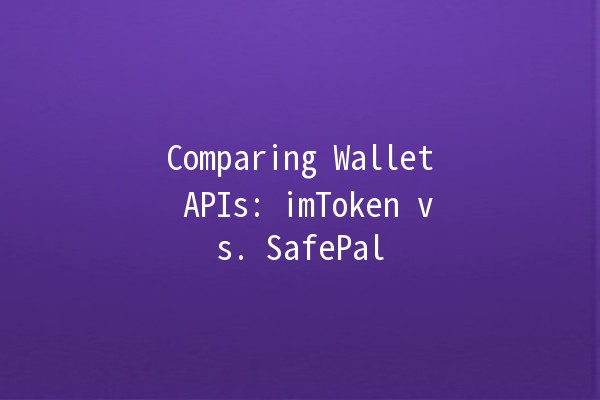In the rapidly evolving world of digital finance, cryptocurrency wallets have emerged as essential tools for managing digital assets. Among the plethora of options, imToken and SafePal have distinguished themselves as two leading platforms. This article offers a thorough comparison of their wallet APIs, analyzing their features, security, usability, and integration capabilities, all of which are fundamental for developers and users alike.

ImToken is a decentralized wallet application that provides users with a secure and efficient way to manage various cryptocurrencies. Launched in 2016, it has gained considerable popularity, especially in Asia, for its userfriendly interface and robust security measures. The imToken wallet allows users to manage multiple types of digital currencies and interact with decentralized applications (DApps).
SafePal is another significant player in the cryptocurrency wallet market. Established in 2018, SafePal offers both hot and cold wallet solutions designed to cater to a broad spectrum of crypto users, from casual holders to professional traders. SafePal was also the official wallet partner for Binance, which speaks volumes about its credibility in the crypto community.
Both imToken and SafePal prioritize user experience but adopt different philosophies in their design.
imToken features a sleek, intuitive interface that is easy for beginners to navigate. The dashboard presents a summary of users’ holdings, market trends, and DApp integration seamlessly.
SafePal, on the other hand, offers a more comprehensive interface that might require some acclimatization for new users. However, it provides extensive options for managing different asset types effectively.
Security remains a paramount concern for cryptocurrency users.
imToken employs stateoftheart security protocols, including private key management and biometric authentication. The wallet ensures that private keys never leave the user's device, establishing a strong shield against hacks.
SafePal moves a step further with a hardware wallet that offers offline storage for maximum security. Their mobile app also includes features like encrypted backup and recovery phrases that ensure user funds remain protected even in the unlikely event of a compromised device.
The ease of integration and use of wallets' APIs is critical for developers building applications or services around these wallets.
The imToken API is designed with developers in mind, offering RESTful interfaces that allow seamless integration with various blockchain services.
Documentation and Support: ImToken provides comprehensive documentation that covers all API functionalities and examples, which is very helpful for development.
Feature Set: The API includes capabilities for wallet management, transaction tracking, and interacting with DApps. This flexibility enhances its usability across various platforms.
SafePal is not far behind in API offerings. Their API suite is also RESTful, providing a versatile set of tools for developers.
Documentation and Support: SafePal’s documentation is extensive and provides clear instructions and sample codes, which streamline the onboarding process for developers.
Feature Set: SafePal’s API supports wallet management, transaction functionalities, exchange capabilities directly through the wallet interface, and much more, making it a preferred choice for businesses looking to build cryptointegrated solutions.
When comparing the productivity features offered by both wallets, it is essential to highlight practical tips for maximizing the effectiveness of using these wallets:
Tip: Familiarize yourself with the wallet’s interface to enhance usability.
Application: Spend time exploring the features of both imToken and SafePal. Bookmark essential sections (e.g., transaction history, DApps) for quicker access in the future.
Tip: Use both hot and cold wallet solutions for different needs.
Application: Store smaller, frequently traded amounts on SafePal's hot wallet while moving significant investments to its cold storage.
Tip: Automate transactions using the wallet APIs.
Application: If you are a developer, integrate imToken or SafePal APIs into your applications to automate routine transactions and improve efficiency.
Tip: Stay updated with cryptocurrency market trends.
Application: Use the features within imToken to get live updates on market trends and leverage SafePal's exchange feature to capitalize on favorable market conditions.
Tip: Connect with user forums and community groups.
Application: Join online forums related to imToken and SafePal where users share tips and experiences, helping you unlock features you might not be aware of.
For beginners, imToken tends to be more userfriendly due to its intuitive design, making it easier for new users to navigate. However, SafePal's comprehensive features can be beneficial once users become more familiar with cryptocurrency management.
Yes, both wallets provide strong security protocols. SafePal’s cold wallet option adds an extra layer of security that is particularly useful for longterm storage of digital assets.
Both imToken and SafePal offer robust API support. While imToken's API is often praised for its clarity and documentation, SafePal also provides a comprehensive API suite that can be easily integrated into various applications.
Both wallets support a wide array of cryptocurrencies. However, checking the latest supported coins on their official sites is essential, as this can change with new market dynamics.
Transaction fees can vary depending on network conditions and choices made by the users. Both wallets generally have competitive rates, but it’s advisable to review their specific fee structures before initiating transactions.
Yes, both imToken and SafePal provide recovery options through a recovery phrase. Properly securing this phrase is crucial to ensuring that you can restore access to your wallet if necessary.
, understanding the differences and similarities between imToken and SafePal can significantly enhance your cryptocurrency management experience. Whether you prioritize user experience, security, or API functionalities, both wallets hold unique advantages that cater to different user needs.